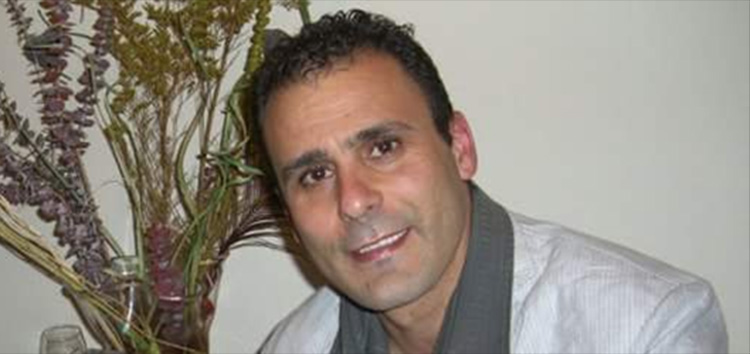Dual National Robin Shahini Serving 18-Year Prison Sentence in Iran Proclaims Innocence in Letter

“Don’t let me remain in this prison as an innocent man.”
Robin (Reza) Shahini, an Iranian-American dual national sentenced to 18 years in prison in October 2016 during a visit to Iran, has proclaimed his innocence in a letter urging human rights groups and international organizations to work for his release.
“I came to Iran to visit my family (on May 25, 2016) because I thought the government’s attitude towards citizens had changed (after Hassan Rouhani became president in 2013) and (the government) wanted to open a new chapter in its interactions with the people on the basis of human rights,” he wrote in the letter, a copy of which was obtained on March 7, 2017 by the Center for Human Rights in Iran (CHRI).
“But unfortunately on (July 11) I was arrested for false reasons and sentenced to a total of 18 years in prison in an unfair trial at Branch 1 of the Gorgan Revolutionary Court,” he said.
Currently being held in Amirabad Prison in the city of Gorgan (approximately 190 miles northeast of Tehran), Shahini has been on hunger strike since February 15, 2017 to protest his unjust sentence and harsh prison conditions.
“My only sin was that as a responsible human being, I expressed my views about my homeland, which is the right of every citizen,” he added. “Don’t let me remain in this prison as an innocent man.”
Sources close to Shahini believe he was arrested by the Revolutionary Guards’ Intelligence Organization because of his social media and blog postings on Iranian politics, and because of comments he had previously made about Iran to Western media, including during interviews with Voice of America, which is banned in the Islamic Republic.
“I am now in Amirabad Prison in Gorgan,” wrote Shahini in his letter. “This place is dangerous for my asthma and could kill me. I am under all sorts of restrictions here that obviously have an adverse effect on morale.”
“On February 14, the prison staff came inside the ward to carry out an inspection,” an informed source previously told the Campaign. “When they saw Reza’s diary, they beat him up and insulted him. They told him, ‘Do you think this is America? You think you can do whatever you like?’ and took his diary away.”
“But the diary is just one incident,” added the source. “Reza also gets insulted by Gorgan Prison staff because he lived in America. They call him names like ‘foreigner’ and ‘spy.’ He’s completely isolated and has become psychologically weak.”
In his letter, Shahini said he has “not been a member of any political group… But like any person, I do have political views.”
“I reject all forms of violence and oppose political schemes,” he said. “I believe that every citizen, regardless of position, status, ethnicity, religion or gender, has the right to express views on domestic or world affairs.”
Recalling the widespread protests against Iran’s disputed 2009 presidential election, Shahini wrote: “At the time (in the US), I too participated in peaceful demonstrations (for democratic reforms in Iran), which is the right of every citizen as recognized in the Constitution … I have not engaged in any violent activities against any country or individual, but at the same time, I have tried to express my views as a student or a responsible individual.”
Regarding photos of him standing next to Iranian opposition figures living in exile posted on Facebook, Shahini said: “I have met many people at various gatherings in my life and posted some of the pictures, including with those who oppose the Islamic Republic. But I have not interacted with anyone who supports violent political action.”
Born in Iran, Shahini, 48, has been living in the US since 2000 and had settled in California, where he received a bachelor’s degree in international security and conflict resolution from San Diego State University.
On July 11, 2016 he was arrested while visiting relatives in Iran. Three months later, the dual national was sentenced to a total of 18 years in prison for “acting against national security,” “participating in protest gatherings in 2009,” “collaborating with Voice of America (VOA) television” and “insulting the sacred on Facebook” by the Revolutionary Court in Gorgan.
In cases involving convictions on multiple charges, Article 134 of Iran’s Islamic Penal Code allows for only the longest sentence to be served, making Shahini eligible for parole after serving nine years for the charge that received the harshest sentence: “collaborating with enemy states through Voice of America.”
The judiciary’s ongoing imprisonment of dual nationals, usually arrested by the Revolutionary Guards’ Intelligence Organization or the Intelligence Ministry, contradicts Rouhani’s repeated calls for expatriates to return to Iran.
The growing number of arrests also reflects hardliners’ efforts to prevent the engagement with the West that the Rouhani administration has sought to encourage.
Iranian-British dual citizen Nazanin Zaghari-Ratcliffe, sentenced to five years in prison in September 2016, has been held since April 2016; Iranian-American businessman Siamak Namazi, held since October 15, 2015 and his Iranian-American father, 80-year-old Bagher Namazi, held since February 2016, have both been sentenced to ten years in prison; British-Iranian dual national Roya Saberi Nobakht, held since October 2013, has been sentenced to seven years in prison; and Iranian-Austrian dual citizen Kamran Ghaderi, held since January 2016, has been sentenced to 10 years in prison.
Iranian-American Karan Vafadari, held since July 2016, and Iranian-born Swedish resident Ahmadreza Jalili, held since April 2016, have not been sentenced yet.






